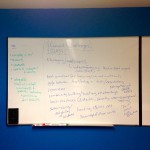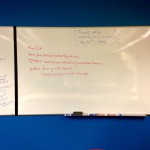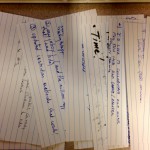Introduction
For the first meeting of our new Ed Tech Community of Practice, we developed a structured activity. We asked everyone in attendance to answer four questions on a notecard:
- Who are you?
- What is the most exciting thing about your position at UO?
- What is the biggest challenge you are currently facing?
- What is one thing you are working on (or want to work on in the near future) that builds on what you find exciting and addresses your challenges?
We got into small groups to make notes and discuss, and then we used the whiteboards in Library 117 to aggregate some of our comments:
-

-
Aggregating our answers to questions 2 and 3
-

-
Collecting some of our answers for question 4
-

-
The stack of notecards!
Summary of Responses
In summarizing our comments, I would first like to note that we had quite a range of attendees at our first meeting! Our 20 participants included employees from IT support units in the School of Architecture & Allied Arts, the College of Arts and Sciences, the Lundquist College of Business, and the College of Education–as well as staff from the Teaching Effectiveness Program, Center for Media and Educational Technologies, Instructional Technology Referral Office, Yamada Language Center, American English Institute, Office of Global Education, Accessible Education Center, Academic Extension, Information Services, and the UO Libraries. That’s an excellent cross-section of the University; well done, us!
What Is Exciting About Our Work?
New. Dynamic. Diverse. Variety. Change. Community. When asked to describe the most exciting aspects of our work here at UO, these words show up repeatedly. We clearly value the fact that our field is “always changing and evolving.” Most of us recognize that being in this field means that we’re always learning. We know the value of keeping up with change, and we seek opportunities to add new skills or explore new technologies. For a lot of us, that also carries over into an appreciation for the campus community, and all of the different people we meet. We have an appreciation for the tools we work with, but also for the people we work with–be they students, faculty, or our fellow staff members. “Working closely with diverse stakeholders” is one of the best parts of our work at the University.
Selected Quotes
Dynamic environment.
Development of new/improved pedagogies.
Variety!
New work every day.
Being able to make a difference in someone’s day/week/month/life!
I love making a difference.
Contributing to inclusion and diversity.
People!
What Is Challenging About Our Work?
To a certain extent, our challenges are a microcosm of the challenges currently facing the University of Oregon. Communicating our skills, roles, and sense of what’s possible, especially in our relationships with faculty, is a persistent thread amongst the comments. That “awareness” can be difficult to foster in others when any one of us has to balance “instructor support with all of [our] other hats,” including staff training, policy development, and marketing our services.
In addition to balance and communication, we almost universally feel like our units are under-resourced. This is manifesting in terms of inadequate support or development of specific types of technologies (video support is mentioned by staff from multiple units), professional development, and physical plant.
Finally, even as agents of change, we sometimes have trouble finding our footing in UO’s “changing landscape.” It can be difficult to “tap into the potential” that we see without a universal willingness to take on “new challenges.”
Selected Quotes
People aren’t willing or are afraid to change.
Keeping one’s head above water!
Helping faculty understand the range of things that I do.
Policy and legal lag behind technology.
Time!
How Can We Use Our Strengths To Address Our Challenges?
We want to create. Whether it’s implementing new tools, developing new policies, designing new organizational structures, or building new physical spaces, the members of our community want to help shape UO’s growth. We’re interested in creating better training and instructional materials, developing and sustaining makerspaces, implementing service management procedures, and building cross-campus community. All of that growth is about providing better service to the university: we want to “[help] people tell their story and [make] it easier for them to tell their story.” We want to connect UO students, faculty, and staff with the rest of the world–or even just with our campuses in Portland and Bend, providing “improved classroom support.” Above all, we want to implement tools and procedures that will streamline our workflows and allow us to provide better, more consistent services across the University of Oregon.
Selected Quotes
Updated instruction materials that work!
Development of a makerspace/community.
More community-building events.
Streamlining services.
Repeatable & predictable processes.
Thank you to all who participated in our first meeting and in this activity. We look forward to more!


